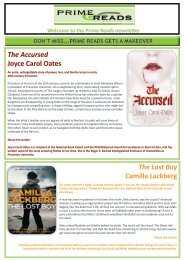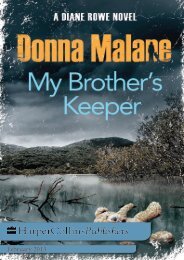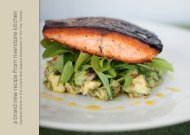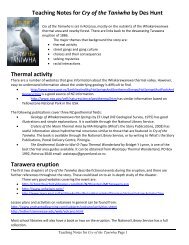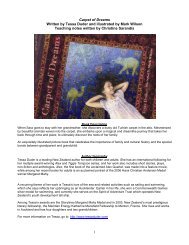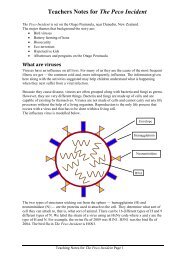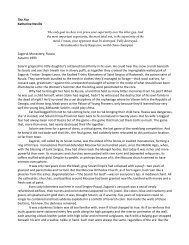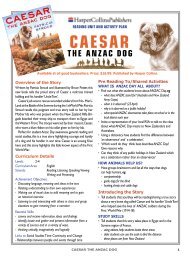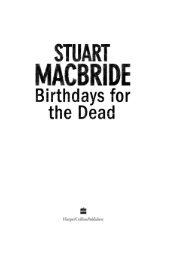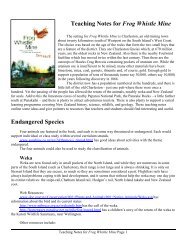DEATH OF KINGS - Harper Collins New Zealand
DEATH OF KINGS - Harper Collins New Zealand
DEATH OF KINGS - Harper Collins New Zealand
Create successful ePaper yourself
Turn your PDF publications into a flip-book with our unique Google optimized e-Paper software.
<strong>DEATH</strong> <strong>OF</strong> <strong>KINGS</strong>
PLACE NAMES<br />
The spelling of place names in Anglo-Saxon England was an uncertain<br />
business, with no consistency and no agreement even about<br />
the name itself. Thus London was variously rendered as Lundonia,<br />
Lundenberg, Lundenne, Lundene, Lundenwic, Lundenceaster and<br />
Lundres. Doubtless some readers will prefer other versions of the<br />
names listed below, but I have usually employed whichever spelling<br />
is cited in either the Oxford or the Cambridge Dictionary of English<br />
Place-Names for the years nearest to AD 900, but even that solution<br />
is not foolproof. Hayling Island, in 956, was written as both<br />
Heilincigae and Hæglingaiggæ. Nor have I been consistent myself;<br />
I should spell England as Englaland, and have preferred the modern<br />
form Northumbria to Norðhymbralond to avoid the suggestion that<br />
the boundaries of the ancient kingdom coincide with those of the<br />
modern county. So this list, like the spellings themselves, is<br />
capricious.<br />
Baddan Byrig<br />
Beamfleot<br />
Bebbanburg<br />
Bedanford<br />
Blaneford<br />
Buccingahamm<br />
Buchestanes<br />
Ceaster<br />
Cent<br />
Cippanhamm<br />
Cirrenceastre<br />
Contwaraburg<br />
Cracgelad<br />
Cumbraland<br />
Cyninges Tun<br />
Cytringan<br />
Dumnoc<br />
Dunholm<br />
Badbury Rings, Dorset<br />
Benfleet, Essex<br />
Bamburgh, Northumberland<br />
Bedford, Bedfordshire<br />
Blandford Forum, Dorset<br />
Buckingham, Bucks<br />
Buxton, Derbyshire<br />
Chester, Cheshire<br />
County of Kent<br />
Chippenham, Wiltshire<br />
Cirencester, Gloucestershire<br />
Canterbury, Kent<br />
Cricklade, Wiltshire<br />
Cumberland<br />
Kingston upon Thames, Greater London<br />
Kettering, Northants<br />
Dunwich, Suffolk<br />
Durham, County Durham
Eanulfsbirig<br />
Eleg<br />
Eoferwic<br />
Exanceaster<br />
Fagranforda<br />
Fearnhamme<br />
Fifhidan<br />
Fughelness<br />
Gegnesburh<br />
Gleawecestre<br />
Grantaceaster<br />
Hothlege, River<br />
Hrofeceastre<br />
Humbre, River<br />
Huntandon<br />
Liccelfeld<br />
Lindisfarena<br />
Lundene<br />
Medwæg, River<br />
Natangrafum<br />
Oxnaforda<br />
Ratumacos<br />
Rochecestre<br />
Sæfern<br />
Sarisberie<br />
Sceaftesburi<br />
Sceobyrig<br />
Scrobbesburh<br />
Snotengaham<br />
Sumorsæte<br />
Temes, River<br />
Thornsæta<br />
Tofeceaster<br />
Trente, River<br />
Turcandene<br />
Tweoxnam<br />
Westune<br />
Wiltunscir<br />
Wimburnan<br />
Wintanceaster<br />
Wygraceaster<br />
St Neot, Cambridgeshire<br />
Ely, Cambridgeshire<br />
York, Yorkshire (called Jorvik by the<br />
Danes)<br />
Exeter, Devon<br />
Fairford, Gloucestershire<br />
Farnham, Surrey<br />
Fyfield, Wiltshire<br />
Foulness Island, Essex<br />
Gainsborough, Lincolnshire<br />
Gloucester, Gloucestershire<br />
Cambridge, Cambridgeshire<br />
Hadleigh Ray, Essex<br />
Rochester, Kent<br />
River Humber<br />
Huntingdon, Cambridgeshire<br />
Lichfield, Staffordshire<br />
Lindisfarne (Holy Island), Northumberland<br />
London<br />
River Medway, Kent<br />
Notgrove, Gloucestershire<br />
Oxford, Oxfordshire<br />
Rouen, Normandy, France<br />
Wroxeter, Shropshire<br />
River Severn<br />
Salisbury, Wiltshire<br />
Shaftesbury, Dorset<br />
Shoebury, Essex<br />
Shrewsbury, Shropshire<br />
Nottingham, Nottinghamshire<br />
Somerset<br />
River Thames<br />
Dorset<br />
Towcester, Northamptonshire<br />
River Trent<br />
Turkdean, Gloucestershire<br />
Christchurch, Dorset<br />
Whitchurch, Shropshire<br />
Wiltshire<br />
Wimborne, Dorset<br />
Winchester, Hampshire<br />
Worcester, Worcestershire
<strong>DEATH</strong> <strong>OF</strong><br />
<strong>KINGS</strong><br />
BERNARD CORNWELL
<strong>Harper</strong><strong>Collins</strong>Publishers<br />
77–85 Fulham Palace Road,<br />
Hammersmith, London W6 8JB<br />
www.harpercollins.co.uk<br />
Published by <strong>Harper</strong><strong>Collins</strong>Publishers 2011<br />
1<br />
Copyright © Bernard Cornwell 2011<br />
Map © John Gilkes 2011<br />
Bernard Cornwell asserts the moral right to<br />
be identified as the author of this work<br />
A catalogue record for this book<br />
is available from the British Library<br />
ISBN 978 0 00 733178 9<br />
This novel is entirely a work of fiction.<br />
The names, characters and incidents portrayed in it while at times based on historical<br />
figures, are the work of the author’s imagination.<br />
Set in Meridien by Palimpsest Book Production Limited,<br />
Falkirk, Stirlingshire<br />
Printed and bound in Great Britain by<br />
Clays Ltd, St Ives plc<br />
All rights reserved. No part of this publication may be<br />
reproduced, stored in a retrieval system, or transmitted,<br />
in any form or by any means, electronic, mechanical,<br />
photocopying, recording or otherwise, without the prior<br />
permission of the publishers.<br />
<br />
<br />
FSC<br />
<br />
is a non-profit international organisation established to promote<br />
the responsible management of the world’s forests. Products carrying the<br />
FSC label are independently certified to assure consumers that they come<br />
from forests that are managed to meet the social, economic and<br />
ecological needs of present and future generations,<br />
and other controlled sources.<br />
Find out more about <strong>Harper</strong><strong>Collins</strong> and the environment at<br />
www.harpercollins.co.uk/green
Death of Kings is for<br />
Anne LeClaire,<br />
Novelist and Friend,<br />
who supplied the first line.
Contents<br />
Place names<br />
iii-iv<br />
Map<br />
xi<br />
Part One<br />
THE SORCERESS<br />
1<br />
Part Two<br />
<strong>DEATH</strong> <strong>OF</strong> A KING<br />
133<br />
Part Three<br />
ANGELS<br />
207<br />
Part Four<br />
<strong>DEATH</strong> IN WINTER<br />
263<br />
HISTORICAL NOTE<br />
331
N<br />
Bebbanburgh<br />
N o r t h<br />
S e a<br />
Eoferwic<br />
I r i s h<br />
S e a<br />
Ceaster<br />
Buchestanes<br />
Dee<br />
Snotengaham<br />
Scrobbesburh<br />
Sæfern<br />
MERCIA<br />
Buccingaham<br />
Natangrafum<br />
Gleawecestre<br />
Fagranforda<br />
Cirrenceastre<br />
Cracgelad<br />
Huntandon<br />
Eanulfsbirig<br />
Temes<br />
Bedanford<br />
Eleg<br />
Use<br />
Beamfleot<br />
Lundene<br />
EAST<br />
ANGLIA<br />
Grantaceaster<br />
WESSEX<br />
Wimburnan<br />
Wintanceaster<br />
K E N T<br />
0 20 40 60 80 miles
The Royal Family<br />
of Wessex<br />
Aethelwulf<br />
King of Wessex (839–858)<br />
m. Osburga<br />
Aethelstan<br />
Aethelbert<br />
King of Wessex (860–865)<br />
Alfred<br />
King of Wessex (871–899)<br />
m. Ealhswith<br />
Aethelbald<br />
King of Wessex (858–860)<br />
Aethelred<br />
King of Wessex (866–871)<br />
Aethelrod<br />
Aethelflaed<br />
m. Aethelred of Mercia<br />
Aethelgifu<br />
Aethelweard<br />
Edward The<br />
Elder<br />
King of West Saxons (899–924)<br />
Aefthryth<br />
Aethelstan
PART ONE<br />
The Sorceress
One<br />
‘Every day is ordinary,’ Father Willibald said, ‘until it isn’t.’ He<br />
smiled happily, as though he had just said something he thought<br />
I would find significant, then looked disappointed when I said<br />
nothing. ‘Every day,’ he started again.<br />
‘I heard your drivelling,’ I snarled.<br />
‘Until it isn’t,’ he finished weakly. I liked Willibald, even if he<br />
was a priest. He had been one of my childhood tutors and now I<br />
counted him as a friend. He was gentle, earnest, and if the meek<br />
ever do inherit the earth then Willibald will be rich beyond measure.<br />
And every day is ordinary until something changes, and that<br />
cold Sunday morning had seemed as ordinary as any until the<br />
fools tried to kill me. It was so cold. There had been rain during<br />
the week, but on that morning the puddles froze and a hard frost<br />
whitened the grass. Father Willibald had arrived soon after sunrise<br />
and discovered me in the meadow. ‘We couldn’t find your estate<br />
last night,’ he explained his early appearance, shivering, ‘so we<br />
stayed at Saint Rumwold’s monastery,’ he gestured vaguely southwards.<br />
‘It was cold there,’ he added.<br />
‘They’re mean bastards, those monks,’ I said. I was supposed to<br />
deliver a weekly cartload of firewood to Saint Rumwold’s, but that<br />
was a duty I ignored. The monks could cut their own timber. ‘Who<br />
was Rumwold?’ I asked Willibald. I knew the answer, but wanted<br />
to drag Willibald through the thorns.<br />
‘He was a very pious child, lord,’ he said.<br />
‘A child?’<br />
3
‘A baby,’ he said, sighing as he saw where the conversation was<br />
leading, ‘a mere three days old when he died.’<br />
‘A three-day-old baby is a saint?’<br />
Willibald flapped his hands. ‘Miracles happen, lord,’ he said,<br />
‘they really do. They say little Rumwold sang God’s praises whenever<br />
he suckled.’<br />
‘I feel much the same when I get hold of a tit,’ I said, ‘so does<br />
that make me a saint?’<br />
Willibald shuddered, then sensibly changed the subject. ‘I’ve<br />
brought you a message from the ætheling,’ he said, meaning King<br />
Alfred’s eldest son, Edward.<br />
‘So tell me.’<br />
‘He’s the King of Cent now,’ Willibald said happily.<br />
‘He sent you all this way to tell me that?’<br />
‘No, no. I thought perhaps you hadn’t heard.’<br />
‘Of course I heard,’ I said. Alfred, King of Wessex, had made<br />
his eldest son King of Cent, which meant Edward could practise<br />
being a king without doing too much damage because Cent, after<br />
all, was a part of Wessex. ‘Has he ruined Cent yet?’<br />
‘Of course not,’ Willibald said, ‘though . . .’ he stopped abruptly.<br />
‘Though what?’<br />
‘Oh it’s nothing,’ he said airily and pretended to take an interest<br />
in the sheep. ‘How many black sheep do you have?’ he asked.<br />
‘I could hold you by the ankles and shake you till the news<br />
drops out,’ I suggested.<br />
‘It’s just that Edward, well,’ he hesitated, then decided he had<br />
better tell me in case I did shake him by the ankles, ‘it’s just that<br />
he wanted to marry a girl in Cent and his father wouldn’t agree.<br />
But really that isn’t important!’<br />
I laughed. So young Edward was not quite the perfect heir after<br />
all. ‘Edward’s on the rampage, is he?’<br />
‘No, no! Merely a youthful fancy and it’s all history now. His<br />
father’s forgiven him.’<br />
I asked nothing more, though I should have paid much more<br />
attention to that sliver of gossip. ‘So what is young Edward’s<br />
message?’ I asked. We were standing in the lower meadow of my<br />
4
estate in Buccingahamm, which lay in eastern Mercia. It was really<br />
Æthelflaed’s land, but she had granted me the food-rents, and the<br />
estate was large enough to support thirty household warriors, most<br />
of whom were in church that morning. ‘And why aren’t you at<br />
church?’ I asked Willibald before he could answer my first question,<br />
‘it’s a feast day, isn’t it?’<br />
‘Saint Alnoth’s Day,’ he said as though that was a special treat,<br />
‘but I wanted to find you!’ He sounded excited. ‘I have King<br />
Edward’s news for you. Every day is ordinary . . .’<br />
‘Until it isn’t,’ I said brusquely.<br />
‘Yes, lord,’ he said lamely, then frowned in puzzlement, ‘but<br />
what are you doing?’<br />
‘I’m looking at sheep,’ I said, and that was true. I was looking<br />
at two hundred or more sheep that looked back at me and bleated<br />
pathetically.<br />
Willibald turned to stare at the flock again. ‘Fine animals,’ he<br />
said as if he knew what he was talking about.<br />
‘Just mutton and wool,’ I said, ‘and I’m choosing which ones<br />
live and which ones die.’ It was the killing time of the year, the<br />
grey days when our animals are slaughtered. We keep a few alive<br />
to breed in the spring, but most have to die because there is not<br />
enough fodder to keep whole flocks and herds alive through the<br />
winter. ‘Watch their backs,’ I told Willibald, ‘because the frost melts<br />
fastest off the fleece of the healthiest beasts. So those are the ones<br />
you keep alive.’ I lifted his woollen hat and ruffled his hair, which<br />
was going grey. ‘No frost on you,’ I said cheerfully, ‘otherwise I’d<br />
have to slit your throat.’ I pointed to a ewe with a broken horn,<br />
‘Keep that one!’<br />
‘Got her, lord,’ the shepherd answered. He was a gnarled little<br />
man with a beard that hid half his face. He growled at his two<br />
hounds to stay where they were, then ploughed into the flock and<br />
used his crook to haul out the ewe, then dragged her to the edge<br />
of the field and drove her to join the smaller flock at the meadow’s<br />
farther end. One of his hounds, a ragged and pelt-scarred beast,<br />
snapped at the ewe’s heels until the shepherd called the dog off.<br />
The shepherd did not need my help in selecting which animals<br />
5
should live and which must die. He had culled his flocks since he<br />
was a child, but a lord who orders his animals slaughtered owes<br />
them the small respect of taking some time with them.<br />
‘The day of judgement,’ Willibald said, pulling his hat over his<br />
ears.<br />
‘How many’s that?’ I asked the shepherd.<br />
‘Jiggit and mumph, lord,’ he said.<br />
‘Is that enough?’<br />
‘It’s enough, lord.’<br />
‘Kill the rest then,’ I said.<br />
‘Jiggit and mumph?’ Willibald asked, still shivering.<br />
‘Twenty and five,’ I said. ‘Yain, tain, tether, mether, mumph. It’s<br />
how shepherds count. I don’t know why. The world is full of<br />
mystery. I’m told some folk even believe that a three-day-old baby<br />
is a saint.’<br />
‘God is not mocked, lord,’ Father Willibald said, attempting to<br />
be stern.<br />
‘He is by me,’ I said, ‘so what does young Edward want?’<br />
‘Oh, it’s most exciting,’ Willibald began enthusiastically, then<br />
checked because I had raised a hand.<br />
The shepherd’s two dogs were growling. Both had flattened<br />
themselves and were facing south towards a wood. Sleet had begun<br />
to fall. I stared at the trees, but could see nothing threatening<br />
among the black winter branches or among the holly bushes.<br />
‘Wolves?’ I asked the shepherd.<br />
‘Haven’t seen a wolf since the year the old bridge fell, lord,’ he<br />
said.<br />
The hair on the dogs’ necks bristled. The shepherd quietened<br />
them by clicking his tongue, then gave a short sharp whistle and<br />
one of the dogs raced away towards the wood. The other whined,<br />
wanting to be let loose, but the shepherd made a low noise and<br />
the dog went quiet again.<br />
The running dog curved towards the trees. She was a bitch and<br />
knew her business. She leaped an ice-skimmed ditch and vanished<br />
among the holly, barked suddenly, then reappeared to jump the<br />
ditch again. For a moment she stopped, facing the trees, then began<br />
6
unning again just as an arrow flitted from the wood’s shadows.<br />
The shepherd gave a shrill whistle and the bitch raced back towards<br />
us, the arrow falling harmlessly behind her.<br />
‘Outlaws,’ I said.<br />
‘Or men looking for deer,’ the shepherd said.<br />
‘My deer,’ I said. I still gazed at the trees. Why would poachers<br />
shoot an arrow at a shepherd’s dog? They would have done better<br />
to run away. So maybe they were really stupid poachers?<br />
The sleet was coming harder now, blown by a cold east wind.<br />
I wore a thick fur cloak, high boots and a fox-fur hat, so did not<br />
notice the cold, but Willibald, in priestly black, was shivering despite<br />
his woollen cape and hat. ‘I must get you back to the hall,’ I said.<br />
‘At your age you shouldn’t be outdoors in winter.’<br />
‘I wasn’t expecting rain,’ Willibald said. He sounded<br />
miserable.<br />
‘It’ll be snow by midday,’ the shepherd said.<br />
‘You have a hut near here?’ I asked him.<br />
He pointed north. ‘Just beyond the copse,’ he said. He was<br />
pointing at a thick stand of trees through which a path led.<br />
‘Does it have a fire?’<br />
‘Yes, lord.’<br />
‘Take us there,’ I said. I would leave Willibald beside the fire<br />
and fetch him a proper cloak and a docile horse to get him back<br />
to the hall.<br />
We walked north and the dogs growled again. I turned to look<br />
south and suddenly there were men at the wood’s edge. A ragged<br />
line of men who were staring at us. ‘You know them?’ I asked the<br />
shepherd.<br />
‘They’re not from around here, lord, and eddera-a-dix,’ he said,<br />
meaning there were thirteen of them, ‘that’s unlucky, lord.’ He<br />
made the sign of the cross.<br />
‘What . . .’ Father Willibald began.<br />
‘Quiet,’ I said. The shepherd’s two dogs were snarling now.<br />
‘Outlaws,’ I guessed, still looking at the men.<br />
‘Saint Alnoth was murdered by outlaws,’ Willibald said<br />
worriedly.<br />
7
‘So not everything outlaws do is bad,’ I said, ‘but these ones are<br />
idiots.’<br />
‘Idiots?’<br />
‘To attack us,’ I said. ‘They’ll be hunted down and ripped apart.’<br />
‘If we are not killed first,’ Willibald said.<br />
‘Just go!’ I pushed him towards the northern trees and touched<br />
a hand to my sword hilt before following him. I was not wearing<br />
Serpent-Breath, my great war sword, but a lesser, lighter blade<br />
that I had taken from a Dane I had killed earlier that year in<br />
Beamfleot. It was a good sword, but at that moment I wished I<br />
had Serpent-Breath strapped around my waist. I glanced back. The<br />
thirteen men were crossing the ditch to follow us. Two had bows.<br />
The rest seemed to be armed with axes, knives or spears. Willibald<br />
was slow, already panting. ‘What is it?’ he gasped.<br />
‘Bandits?’ I suggested. ‘Vagrants? I don’t know. Run!’ I pushed<br />
him into the trees, then slid the sword from its scabbard and turned<br />
to face my pursuers, one of whom took an arrow from the bag<br />
strapped at his waist. That persuaded me to follow Willibald into<br />
the copse. The arrow slid past me and ripped through the undergrowth.<br />
I wore no mail, only the thick fur cloak that offered no<br />
protection from a hunter’s arrow. ‘Keep going,’ I shouted at<br />
Willibald, then limped up the path. I had been wounded in the<br />
right thigh at the battle of Ethandun and though I could walk and<br />
could even run slowly, I knew I would not be able to outpace the<br />
men who were now within easy bowshot behind me. I hurried up<br />
the path as a second arrow was deflected by a branch and tumbled<br />
noisily through the trees. Every day is ordinary, I thought, until it<br />
gets interesting. My pursuers could not see me among the dark<br />
trunks and thick holly bushes, but they assumed I had followed<br />
Willibald and so kept to the path while I crouched in the thick<br />
undergrowth, concealed by the glossy leaves of a holly bush and<br />
by my cloak that I had pulled over my fair hair and face. The<br />
pursuers went past my hiding place without a glance. The two<br />
archers were in front.<br />
I let them get well ahead, then followed. I had heard them speak<br />
as they passed and knew they were Saxons and, by their accents,<br />
8
probably from Mercia. Robbers, I assumed. A Roman road passed<br />
through deep woods nearby and masterless men haunted the woods<br />
to ambush travellers who, to protect themselves, went in large<br />
groups. I had twice led my warriors on hunts for such bandits and<br />
thought I had persuaded them to make their living far from my<br />
estate, but I could not think who else these men could be. Yet it<br />
was not like such vagrants to invade an estate. The hair at the<br />
back of my neck still prickled.<br />
I moved cautiously as I approached the edge of the trees, then<br />
saw the men beside the shepherd’s hut that resembled a heap of<br />
grass. He had made the hovel with branches covered by turf, leaving<br />
a hole in the centre for the smoke of his fire to escape. There was<br />
no sign of the shepherd himself, but Willibald had been captured,<br />
though so far he was unhurt, protected, perhaps, by his status as<br />
a priest. One man held him. The others must have realised I was<br />
still in the trees, because they were staring towards the copse that<br />
hid me.<br />
Then, suddenly, the shepherd’s two dogs appeared from my left<br />
and ran howling towards the thirteen men. The dogs ran fast and<br />
lithe, circling the group and sometimes leaping towards them and<br />
snapping their teeth before sheering away. Only one man had a<br />
sword, but he was clumsy with the blade, swinging it at the bitch<br />
as she came close and missing her by an arm’s length. One of the<br />
two bowmen put a string on his cord. He hauled the arrow back,<br />
then suddenly fell backwards as if struck by an invisible hammer.<br />
He sprawled on the turf as his arrow flitted into the sky and fell<br />
harmlessly into the trees behind me. The dogs, down on their front<br />
paws now, bared their teeth and growled. The fallen archer stirred,<br />
but evidently could not stand. The other men looked scared.<br />
The second archer raised his stave, then recoiled, dropping the<br />
bow to clap his hands to his face and I saw a spark of blood there,<br />
blood bright as the holly berries. The splash of colour showed in<br />
the winter morning, then it was gone and the man was clutching<br />
his face and bending over in pain. The hounds barked, then loped<br />
back into the trees. The sleet was falling harder, loud as it struck<br />
the bare branches. Two of the men moved towards the shepherd’s<br />
9
cottage, but were called back by their leader. He was younger than<br />
the others and looked more prosperous, or at least less poor. He<br />
had a thin face, darting eyes and a short fair beard. He wore a<br />
scarred leather jerkin, but beneath it I could see a mail coat. So<br />
he had either been a warrior or else had stolen the mail. ‘Lord<br />
Uhtred!’ he called.<br />
I did not answer. I was hidden well enough, at least for the<br />
moment, but knew I would have to move if they searched the<br />
copse, but whatever had drawn blood was making them nervous.<br />
What was it? It had to be the gods, I thought, or perhaps the<br />
Christian saint. Alnoth must hate outlaws if he had been murdered<br />
by them, and I did not doubt that these men were outlaws who<br />
had been sent to kill me. That was not surprising because in those<br />
days I had plenty of enemies. I still have enemies, though now I<br />
live behind the strongest palisade in northern England, but in that<br />
far-off time, in the winter of 898, there was no England. There<br />
was Northumbria and East Anglia, Mercia and Wessex, and the<br />
first two were ruled by the Danes, Wessex was Saxon while Mercia<br />
was a mess, part Danish and part Saxon. And I was like Mercia<br />
because I had been born a Saxon, but raised as a Dane. I still<br />
worshipped the Danish gods, but fate had doomed me to be a<br />
shield of the Christian Saxons against the ever-present threat of<br />
the pagan Danes. So any number of Danes might want me dead,<br />
but I could not imagine any Danish enemy hiring Mercian outlaws<br />
to ambush me. There were also Saxons who would love to see my<br />
corpse put in its long home. My cousin Æthelred, Lord of Mercia,<br />
would have paid well to watch my grave filled, but surely he would<br />
have sent warriors, not bandits? Yet he seemed the likeliest man.<br />
He was married to Æthelflaed, Alfred of Wessex’s daughter, but<br />
I had planted the cuckold’s horns on Æthelred’s head and I reckoned<br />
he had returned the favour by sending thirteen outlaws.<br />
‘Lord Uhtred!’ the young man called again, but the only answer<br />
was a sudden panicked bleating.<br />
The sheep were streaming down the path through the copse,<br />
harried by the two dogs that snapped at their ankles to drive<br />
them fast towards the thirteen men and, once the sheep had<br />
10
eached the men, the dogs raced around, still snapping, herding<br />
the animals into a tight circle that enclosed the outlaws. I was<br />
laughing. I was Uhtred of Bebbanburg, the man who had killed<br />
Ubba beside the sea and who had destroyed Haesten’s army at<br />
Beamfleot, but on this cold Sunday morning it was the shepherd<br />
who was proving to be the better warlord. His panicked flock<br />
were tightly packed around the outlaws, who could hardly move.<br />
The dogs were howling, the sheep bleating and the thirteen men<br />
despairing.<br />
I stepped out of the wood. ‘You wanted me?’ I called.<br />
The young man’s response was to push towards me, but the<br />
tightly packed sheep obstructed him. He kicked at them, then<br />
hacked down with his sword, but the more he struggled the more<br />
scared the sheep became, and all the while the dogs herded them<br />
inwards. The young man cursed, then snatched at Willibald. ‘Let<br />
us go or we kill him,’ he said.<br />
‘He’s a Christian,’ I said, showing him Thor’s hammer that hung<br />
about my neck, ‘so why should I care if you kill him?’<br />
Willibald stared at me aghast, and then turned as one of the<br />
men shouted in pain. There had again been a sudden flash of<br />
holly-red blood in the sleet, and this time I saw what had caused<br />
it. It was neither the gods nor the murdered saint, but the shepherd<br />
who had come from the trees and was holding a sling. He took a<br />
stone from a pouch, placed it in the leather cup, and whirled the<br />
sling again. It made a whirring noise, he let go one cord and<br />
another stone hurtled in to strike a man.<br />
They turned away in pure panic and I gestured at the shepherd<br />
to let them go. He whistled to call the dogs off and both men and<br />
sheep scattered. The men were running, all but the first archer<br />
who was still on the ground, stunned by the stone that had struck<br />
his head. The young man, braver than the others, came towards<br />
me, perhaps thinking his companions would help him, then realised<br />
he was alone. A look of pure fright crossed his face, he turned,<br />
and just then the bitch leaped at him, sinking her teeth in his<br />
sword arm. He shouted, then tried to shake her off as the dog<br />
hurtled in to join his mate. He was still shouting when I hit him<br />
11
across the back of the skull with the flat of my sword-blade. ‘You<br />
can call the dogs off now,’ I told the shepherd.<br />
The first archer was still alive, but there was a patch of bloodmatted<br />
hair above his right ear. I kicked him hard in the ribs and<br />
he groaned, but he was insensible. I gave his bow and arrow-bag<br />
to the shepherd. ‘What’s your name?’<br />
‘Egbert, lord.’<br />
‘You’re a rich man now, Egbert,’ I told him. I wished that were<br />
true. I would reward Egbert well for this morning’s work, but I<br />
was no longer rich. I had spent my money on the men, mail and<br />
weapons that had been needed to defeat Haesten and I was desperately<br />
poor that winter.<br />
The other outlaws had vanished, gone back northwards. Willibald<br />
was shaking. ‘They were searching for you, lord,’ he said through<br />
chattering teeth, ‘they’ve been paid to kill you.’<br />
I stooped by the archer. The shepherd’s stone had shattered his<br />
skull and I could see a ragged, splintered piece of bone among the<br />
blood-matted hair. One of the shepherd’s dogs came to sniff the<br />
wounded man and I patted its thick wiry pelt. ‘They’re good dogs,’<br />
I told Egbert.<br />
‘Wolf-killers, lord,’ he said, then hefted the sling, ‘though this<br />
is better.’<br />
‘You’re good with it,’ I said. That was mild, the man was lethal.<br />
‘Been practising these twenty-five years, lord. Nothing like a<br />
stone to drive a wolf away.’<br />
‘They’d been paid to kill me?’ I asked Willibald.<br />
‘That’s what they said. They were paid to kill you.’<br />
‘Go into the hut,’ I said, ‘get warm.’ I turned on the younger<br />
man who was being guarded by the larger dog. ‘What’s your name?’<br />
He hesitated, then spoke grudgingly, ‘Wærfurth, lord.’<br />
‘And who paid you to kill me?’<br />
‘I don’t know, lord.’<br />
Nor did he, it seemed. Wærfurth and his men came from near<br />
Tofeceaster, a settlement not far to the north, and Wærfurth told<br />
me how a man had promised to pay my weight in silver in return<br />
for my death. The man had suggested a Sunday morning, knowing<br />
12
that much of my household would be in church, and Wærfurth<br />
had recruited a dozen vagrants to do the job. He must have known<br />
it was a huge gamble, for I was not without reputation, but the<br />
reward was immense. ‘Was the man a Dane or a Saxon?’ I asked.<br />
‘A Saxon, lord.’<br />
‘And you don’t know him?’<br />
‘No, lord.’<br />
I questioned him more, but all he could tell me was that the<br />
man was thin, bald and had lost an eye. The description meant<br />
little to me. A one-eyed, bald man? Could be almost anyone. I<br />
asked questions till I had wrung Wærfurth dry of unhelpful answers,<br />
then hanged both him and the archer.<br />
And Willibald showed me the magic fish.<br />
A delegation waited at my hall. Sixteen men had come from Alfred’s<br />
capital at Wintanceaster and among them were no less than five<br />
priests. Two, like Willibald, came from Wessex, and the other pair<br />
were Mercians who had apparently settled in East Anglia. I knew<br />
them both, though I had not recognised them at first. They were<br />
twins, Ceolnoth and Ceolberht who, some thirty years before, had<br />
been hostages with me in Mercia. We had been children captured<br />
by the Danes, a fate I had welcomed and the twins had hated.<br />
They were close to forty years old now, two identical priests with<br />
stocky builds, round faces and greying beards. ‘We have watched<br />
your progress,’ one of them said.<br />
‘With admiration,’ the other finished. I had not been able to tell<br />
them apart when they were children, and still could not. They<br />
finished each other’s sentences.<br />
‘Reluctant,’ one said.<br />
‘Admiration,’ his twin said.<br />
‘Reluctant?’ I asked in an unfriendly tone.<br />
‘It is known that Alfred is disappointed,’<br />
‘That you eschew the true faith, but . . .’<br />
‘We pray for you daily!’<br />
13
The remaining pair of priests, both West Saxons, were Alfred’s<br />
men. They had helped compile his code of laws and it appeared<br />
they had come to advise me. The remaining eleven men were<br />
warriors, five from East Anglia and six from Wessex, who had<br />
guarded the priests on their travels.<br />
And they had brought the magic fish.<br />
‘King Eohric,’ Ceolnoth or Ceolberht said.<br />
‘Wishes an alliance with Wessex,’ the other twin finished.<br />
‘And with Mercia!’<br />
‘The Christian kingdoms, you understand.’<br />
‘And King Alfred and King Edward,’ Willibald took up the tale,<br />
‘have sent a gift for King Eohric.’<br />
‘Alfred still lives?’ I asked.<br />
‘Pray God, yes,’ Willibald said, ‘though he’s sick.’<br />
‘Very close to death,’ one of the West Saxon priests<br />
intervened.<br />
‘He was born close to death,’ I said, ‘and ever since I’ve known<br />
him he’s been dying. He’ll live ten years yet.’<br />
‘Pray God he does,’ Willibald said and made the sign of the<br />
cross. ‘But he’s fifty years old, and he’s failing. He’s truly dying.’<br />
‘Which is why he seeks this alliance,’ the West Saxon priest<br />
went on, ‘and why the Lord Edward makes this request of you.’<br />
‘King Edward,’ Willibald corrected his fellow priest.<br />
‘So who’s requesting me?’ I asked, ‘Alfred of Wessex or Edward<br />
of Cent?’<br />
‘Edward,’ Willibald said.<br />
‘Eohric,’ Ceolnoth and Ceolberht said together.<br />
‘Alfred,’ the West Saxon priest said.<br />
‘All of them,’ Willibald added. ‘It’s important to all of them,<br />
lord!’<br />
Edward or Alfred or both wanted me to go to King Eohric of<br />
East Anglia. Eohric was a Dane, but he had converted to Christianity,<br />
and he had sent the twins to Alfred and proposed that a great<br />
alliance should be made between the Christian parts of Britain.<br />
‘King Eohric suggested that you should negotiate the treaty,’<br />
Ceolnoth or Ceolberht said.<br />
14
‘With our advice,’ one of the West Saxon priests put in hastily.<br />
‘Why me?’ I asked the twins.<br />
Willibald answered for them. ‘Who knows Mercia and Wessex<br />
as well as you?’<br />
‘Many men,’ I answered.<br />
‘And where you lead,’ Willibald said, ‘those other men will<br />
follow.’<br />
We were at a table on which was ale, bread, cheese, pottage<br />
and apples. The central hearth was ablaze with a great fire that<br />
flickered its light on the smoke-blackened beams. The shepherd<br />
had been right and the sleet had turned to snow and some flakes<br />
sifted through the smoke-hole in the roof. Outside, beyond the<br />
palisade, Wærfurth and the archer were hanging from the bare<br />
branch of an elm, their bodies food for the hungry birds. Most of<br />
my men were in the hall, listening to our conversation. ‘It’s a<br />
strange time of year to be making treaties,’ I said.<br />
‘Alfred has little time left,’ Willibald said, ‘and he wishes this<br />
alliance, lord. If all the Christians of Britain are united, lord, then<br />
young Edward’s throne will be protected when he inherits the<br />
crown.’<br />
That made sense, but why would Eohric want the alliance?<br />
Eohric of East Anglia had been perched on the fence between<br />
Christians and pagans, Danes and Saxons, for as long as I could<br />
remember, yet now he wanted to proclaim his allegiance to the<br />
Christian Saxons?<br />
‘Because of Cnut Ranulfson,’ one of the twins explained when<br />
I asked the question.<br />
‘He’s brought men south,’ the other twin said.<br />
‘To Sigurd Thorrson’s lands,’ I said. ‘I know, I sent that news to<br />
Alfred. And Eohric fears Cnut and Sigurd?’<br />
‘He does,’ Ceolnoth or Ceolberht said.<br />
‘Cnut and Sigurd won’t attack now,’ I said, ‘but in the spring,<br />
maybe.’ Cnut and Sigurd were Danes from Northumbria and, like<br />
all the Danes, their abiding dream was to capture all the lands<br />
where English was spoken. The invaders had tried again and again,<br />
and again and again they had failed, yet another attempt was<br />
15
inevitable because the heart of Wessex, which was the great bastion<br />
of Saxon Christendom, was failing. Alfred was dying, and his death<br />
would surely bring pagan swords and heathen fire to Mercia and<br />
to Wessex. ‘But why would Cnut or Sigurd attack Eohric?’ I asked.<br />
‘They don’t want East Anglia, they want Mercia and Wessex.’<br />
‘They want everything,’ Ceolnoth or Ceolberht answered.<br />
‘And the true faith will be scourged from Britain unless we<br />
defend it,’ the older of the two West Saxon priests said.<br />
‘Which is why we beg you to forge the alliance,’ Willibald said.<br />
‘At the Christmas feast,’ one of the twins added.<br />
‘And Alfred sent a gift for Eohric,’ Willibald went on enthusiastically,<br />
‘Alfred and Edward! They have been most generous, lord!’<br />
The gift was encased in a box of silver studded with precious<br />
stones. The lid of the box showed a figure of Christ with uplifted<br />
arms, around which was written ‘Edward mec heht Gewyrcan’,<br />
meaning that Edward had ordered the reliquary made, or more<br />
likely his father had ordered the gift and then ascribed the generosity<br />
to his son. Willibald lifted the lid reverently, revealing an<br />
interior lined with red-dyed cloth. A small cushion, the width and<br />
breadth of a man’s hand, fitted snugly inside, and on the cushion<br />
was a fish skeleton. It was the whole fish skeleton, except for the<br />
head, just a long white spine with a comb of ribs on either side.<br />
‘There,’ Willibald said, breathing the word as if speaking too loud<br />
might disturb the bones.<br />
‘A dead herring?’ I asked incredulously, ‘that’s Alfred’s gift?’<br />
The priests all crossed themselves.<br />
‘How many more fish bones do you want?’ I asked. I looked at<br />
Finan, my closest friend and the commander of my household<br />
warriors. ‘We can provide dead fish, can’t we?’<br />
‘By the barrelful, lord,’ he said.<br />
‘Lord Uhtred!’ Willibald, as ever, rose to my taunting. ‘That fish,’<br />
he pointed a quivering finger at the bones, ‘was one of the two<br />
fishes our Lord used to feed the five thousand!’<br />
‘The other one must have been a damned big fish,’ I said, ‘what<br />
was it? A whale?’<br />
The older West Saxon priest scowled at me. ‘I advised King<br />
16
Edward against employing you for this duty,’ he said, ‘I told him<br />
to send a Christian.’<br />
‘So use someone else,’ I retorted. ‘I’d rather spend Yule in my<br />
own hall.’<br />
‘He wishes you to go,’ the priest said sharply.<br />
‘Alfred also wishes it,’ Willibald put in, then smiled, ‘he thinks<br />
you’ll frighten Eohric.’<br />
‘Why does he want Eohric frightened?’ I asked. ‘I thought this<br />
was an alliance?’<br />
‘King Eohric allows his ships to prey on our trade,’ the priest<br />
said, ‘and must pay reparations before we promise him protection.<br />
The king believes you will be persuasive.’<br />
‘We don’t need to leave for at least ten days,’ I said, looking<br />
gloomily at the priests, ‘am I supposed to feed you all till then?’<br />
‘Yes, lord,’ Willibald said happily.<br />
Fate is strange. I had rejected Christianity, preferring the gods<br />
of the Danes, but I loved Æthelflaed, Alfred’s daughter, and she<br />
was a Christian and that meant I carried my sword on the side of<br />
the cross.<br />
And because of that it seemed I would spend Yule in East Anglia.<br />
Osferth came to Buccingahamm, bringing another twenty of my<br />
household warriors. I had summoned them, wanting a large band<br />
to accompany me to East Anglia. King Eohric might have suggested<br />
the treaty, and he might be amenable to whatever demands Alfred<br />
made, but treaties are best negotiated from a position of strength<br />
and I was determined to arrive in East Anglia with an impressive<br />
escort. Osferth and his men had been watching Ceaster, a Roman<br />
camp on Mercia’s far north-western frontier where Haesten had<br />
taken refuge after his forces had been destroyed at Beamfleot.<br />
Osferth greeted me solemnly, as was his manner. He rarely smiled,<br />
and his customary expression suggested disapproval of whatever<br />
he saw, but I think he was glad to be reunited with the rest of<br />
us. He was Alfred’s son, born to a servant girl before Alfred<br />
17
discovered the dubious joys of Christian obedience. Alfred<br />
had wanted his bastard son trained as a priest, but Osferth had<br />
preferred the way of the warrior. It had been a strange choice,<br />
for he did not take great joy from a fight or yearn for the savage<br />
moments when anger and a blade make the rest of the world<br />
seem dull, yet Osferth brought his father’s qualities to a fight. He<br />
was serious, thoughtful and methodical. Where Finan and I could<br />
be rashly headstrong, Osferth used cleverness, and that was no<br />
bad thing in a warrior.<br />
‘Haesten is still licking his wounds,’ he told me.<br />
‘We should have killed him,’ I grumbled. Haesten had retreated<br />
to Ceaster after I had destroyed his fleet and army at Beamfleot.<br />
My instinct had been to follow him there and finish his nonsense<br />
once and for all, but Alfred had wanted his household troops back<br />
in Wessex and I did not have enough men to besiege the walls of<br />
the Roman fort at Ceaster, and so Haesten still lived. We watched<br />
him, looking for evidence that he was recruiting more men, but<br />
Osferth reckoned Haesten was getting weaker rather than stronger.<br />
‘He’ll be forced to swallow his pride and swear loyalty to someone<br />
else,’ he suggested.<br />
‘To Sigurd or Cnut,’ I said. Sigurd and Cnut were now the most<br />
powerful Danes in Britain, though neither was a king. They had<br />
land, wealth, flocks, herds, silver, ships, men and ambition. ‘Why<br />
would they want East Anglia?’ I wondered aloud.<br />
‘Why not?’ Finan asked. He was my closest companion, the man<br />
I trusted most in a fight.<br />
‘Because they want Wessex,’ I said.<br />
‘They want all of Britain,’ Finan said.<br />
‘They’re waiting,’ Osferth said.<br />
‘For what?’<br />
‘Alfred’s death,’ he said. He hardly ever called Alfred ‘my father’,<br />
as though he, like the king, was ashamed of his birth.<br />
‘Oh there’ll be chaos when that happens,’ Finan said with relish.<br />
‘Edward will make a good king,’ Osferth said reprovingly.<br />
‘He’ll have to fight for it,’ I said. ‘The Danes will test him.’<br />
‘And will you fight for him?’ Osferth asked.<br />
18
‘I like Edward,’ I said non-committally. I did like him. I had<br />
pitied him as a child because his father placed him under the<br />
control of fierce priests whose duty was to make Edward the perfect<br />
heir for Alfred’s Christian kingdom. When I met him again, just<br />
before the fight at Beamfleot, he had struck me as a pompous and<br />
intolerant young man, but he had enjoyed the company of warriors<br />
and the pomposity vanished. He had fought well at Beamfleot and<br />
now, if Willibald’s gossip was to be believed, he had learned a little<br />
about sin as well.<br />
‘His sister would want you to support him,’ Osferth said pointedly,<br />
making Finan laugh. Everyone knew Æthelflaed was my<br />
lover, as they knew Æthelflaed’s father was also Osferth’s father,<br />
but most people politely pretended not to know, and Osferth’s<br />
pointed remark was as close as he dared refer to my relationship<br />
with his half-sister. I would much rather have been with Æthelflaed<br />
for the Christmas feast, but Osferth told me she had been summoned<br />
to Wintanceaster and I knew I was not welcome at Alfred’s table.<br />
Besides, I now had the duty of delivering the magic fish to Eohric<br />
and I was worried that Sigurd and Cnut would raid my lands while<br />
I was in East Anglia.<br />
Sigurd and Cnut had sailed south the previous summer, taking<br />
their ships to Wessex’s southern coast while Haesten’s army ravaged<br />
Mercia. The two Northumbrian Danes had thought to distract<br />
Alfred’s army while Haesten ran wild on Wessex’s northern border,<br />
but Alfred had sent me his troops anyway, Haesten had been<br />
stripped of his power, and Sigurd and Cnut had discovered they<br />
were powerless to capture any of Alfred’s burhs, the fortified towns<br />
that were scattered all across the Saxon lands, and so had returned<br />
to their ships. I knew they would not rest. They were Danes, which<br />
meant they were planning mischief.<br />
So next day, in the melting snow, I took Finan, Osferth and<br />
thirty men north to Ealdorman Beornnoth’s land. I liked Beornnoth.<br />
He was old, grizzled, lame and fiery. His lands were at the very<br />
edge of Saxon Mercia and everything to the north of him belonged<br />
to the Danes, which meant that in the last few years he had been<br />
forced to defend his fields and villages against the attacks of Sigurd<br />
19
Thorrson’s men. ‘God Almighty,’ he greeted me, ‘don’t say you’re<br />
hoping for the Christmas feast in my hall?’<br />
‘I prefer good food,’ I said.<br />
‘And I prefer good-looking guests,’ he retorted, then shouted for<br />
his servants to take our horses. He lived a little north and east of<br />
Tofeceaster in a great hall surrounded by barns and stables that were<br />
protected by a stout palisade. The space between the hall and his<br />
largest barn was now being blood-soaked by the slaughter of cattle.<br />
Men were hamstringing the frightened beasts to buckle them to the<br />
ground and so keep them still while other men killed them with an<br />
axe blow to the forehead. The twitching carcasses were dragged to<br />
one side where women and children used long knives to skin and<br />
butcher the corpses. Dogs watched or else fought over the scraps of<br />
offal thrown their way. The air stank of blood and dung. ‘It was a<br />
good year,’ Beornnoth told me, ‘twice as many animals as last year.<br />
The Danes left me alone.’<br />
‘No cattle raids?’<br />
‘One or two,’ he shrugged. Since last I saw him he had lost the<br />
use of his legs and needed to be carried everywhere in a chair. ‘It’s<br />
old age,’ he told me. ‘I’m dying from the ground up. I suppose<br />
you want ale?’<br />
We exchanged news in his hall. He bellowed with laughter when<br />
I told him of the attempt on my life. ‘You use sheep to defend<br />
yourself these days?’ He saw his son enter the hall and shouted<br />
at him. ‘Come and hear how the Lord Uhtred won the battle of<br />
the sheep!’<br />
The son was called Beortsig and, like his father, was broadshouldered<br />
and heavy-bearded. He laughed at the tale, but the<br />
laughter seemed forced. ‘You say the rogues came from Tofeceaster?’<br />
he asked.<br />
‘That’s what the bastard said.’<br />
‘That’s our land,’ Beortsig said.<br />
‘Outlaws,’ Beornnoth said dismissively.<br />
‘And fools,’ Beortsig added.<br />
‘A thin, bald, one-eyed man recruited them,’ I said. ‘Do you<br />
know anyone who looks like that?’<br />
20
‘Sounds like our priest,’ Beornnoth said, amused. Beortsig said<br />
nothing. ‘So what brings you here?’ Beornnoth asked, ‘other than<br />
the need to drain my ale barrels?’<br />
I told him of Alfred’s request that I seal a treaty with Eohric,<br />
and how Eohric’s envoys had explained their king’s request because<br />
of his fear of Sigurd and Cnut. Beornnoth looked sceptical. ‘Sigurd<br />
and Cnut aren’t interested in East Anglia,’ he said.<br />
‘Eohric thinks they are.’<br />
‘The man’s a fool,’ Beornnoth said, ‘and always was. Sigurd and<br />
Cnut want Mercia and Wessex.’<br />
‘And once they possess those kingdoms, lord,’ Osferth spoke<br />
softly to our host, ‘they’ll want East Anglia.’<br />
‘True, I suppose,’ Beornnoth allowed.<br />
‘So why not take East Anglia first?’ Osferth suggested, ‘and add<br />
its men to their war-bands?’<br />
‘Nothing will happen till Alfred dies,’ Beornnoth suggested. He<br />
made the sign of the cross, ‘and I pray he still lives.’<br />
‘Amen,’ Osferth said.<br />
‘So you want to disturb Sigurd’s peace?’ Beornnoth asked me.<br />
‘I want to know what he’s doing,’ I said.<br />
‘He’s preparing for Yule,’ Beortsig said dismissively.<br />
‘Which means he’ll be drunk for the next month,’ the father<br />
added.<br />
‘He’s left us in peace all year,’ the son said.<br />
‘And I don’t want you poking his wasps out of their nest,’<br />
Beornnoth said. He spoke lightly enough, but his meaning was<br />
heavy. If I rode on north then I might provoke Sigurd, then<br />
Beornnoth’s land would be thudded by Danish hooves and<br />
reddened by Danish blades.<br />
‘I have to go to East Anglia,’ I explained, ‘and Sigurd’s not going<br />
to like the thought of an alliance between Eohric and Alfred. He<br />
might send men south to make his displeasure known.’<br />
Beornnoth frowned. ‘Or he might not.’<br />
‘Which is what I want to find out,’ I said.<br />
Beornnoth grunted at that. ‘You’re bored, Lord Uhtred?’ he<br />
asked. ‘You want to kill a few Danes?’<br />
21
‘I just want to smell them,’ I said.<br />
‘Smell?’<br />
‘Half Britain will already know of this treaty with Eohric,’ I said,<br />
‘and who has the most interest in preventing it?’<br />
‘Sigurd,’ Beornnoth admitted after a pause.<br />
I sometimes thought of Britain as a mill. At the base, heavy and<br />
dependable was the millstone of Wessex, while at the top, just as<br />
heavy, was the grindstone of the Danes, and Mercia was crushed<br />
between them. Mercia was where Saxon and Dane fought most<br />
often. Alfred had cleverly extended his authority over much of the<br />
kingdom’s south, but the Danes were lords of its north, and till<br />
now the struggle had been fairly evenly divided, which meant both<br />
sides sought allies. The Danes had offered enticements to the Welsh<br />
kings, but though the Welsh nursed an undying hatred of all<br />
Saxons, they feared the wrath of their Christian God more than<br />
they feared the Danes, and so most of the Welsh kept an uneasy<br />
peace with Wessex. To the east, though, lay the unpredictable<br />
kingdom of East Anglia, which was ruled by Danes, but was ostensibly<br />
Christian. East Anglia could tip the scales. If Eohric sent men<br />
to fight against Wessex then the Danes would win, but if he allied<br />
himself with the Christians then the Danes would face defeat.<br />
Sigurd, I thought, would want to prevent the treaty ever<br />
happening, and he had two weeks to do that. Had he sent the<br />
thirteen men to kill me? As I sat by Beornnoth’s fire, that seemed<br />
the best answer. And if he had, then what would he do next?<br />
‘You want to smell him, eh?’ Beornnoth asked.<br />
‘Not provoke him,’ I promised.<br />
‘No deaths? No robbery?’<br />
‘I won’t start anything,’ I promised.<br />
‘God knows what you’ll discover without slaughtering a few of<br />
the bastards,’ Beornnoth said, ‘but yes. Go and sniff. Beortsig will<br />
go with you.’ He was sending his son and a dozen household<br />
warriors to make sure we kept our word. Beornnoth feared we<br />
planned to lay waste a few Danish steadings and bring back cattle,<br />
silver and slaves, and his men would be there to prevent that, but<br />
in truth I only wanted to smell the land.<br />
22
I did not trust Sigurd or his ally, Cnut. I liked both of them, but<br />
knew they would kill me as casually as we kill our winter cattle.<br />
Sigurd was the wealthier of the two men, while Cnut the more<br />
dangerous. He was young still, and in his few years he had gained<br />
a reputation as a sword-Dane, a man whose blade was to be<br />
respected and feared. Such a man attracted others. They came from<br />
across the sea, rowing to Britain to follow a leader who promised<br />
them wealth. And in the spring, I thought, the Danes would surely<br />
come again, or perhaps they would wait till Alfred died, knowing<br />
that the death of a king brings uncertainty, and in uncertainty lies<br />
opportunity.<br />
Beortsig was thinking the same. ‘Is Alfred really dying?’ he asked<br />
me as we rode north.<br />
‘So everyone says.’<br />
‘They’ve said it before.’<br />
‘Many times,’ I agreed.<br />
‘You believe it?’<br />
‘I haven’t seen him for myself,’ I said, and I knew I would not<br />
be welcome in his palace even if I wanted to see him. I had been<br />
told Æthelflaed had gone to Wintanceaster for the Christmas feast,<br />
but more likely she had been summoned for the death-watch rather<br />
than for the dubious delights of her father’s table.<br />
‘And Edward will inherit?’ Beortsig asked.<br />
‘That’s what Alfred wants.’<br />
‘And who becomes king in Mercia?’ he asked.<br />
‘There is no king in Mercia,’ I said.<br />
‘There should be,’ he said bitterly, ‘and not a West Saxon either!<br />
We’re Mercians, not West Saxons.’ I said nothing in response.<br />
There had once been kings in Mercia, but now it was subservient<br />
to Wessex. Alfred had managed that. His daughter was married to<br />
the most powerful of the Mercian ealdormen, and most Saxons in<br />
Mercia seemed content that they were effectively under Alfred’s<br />
protection, but not all Mercians liked that West Saxon dominance.<br />
When Alfred died the powerful Mercians would start eyeing their<br />
empty throne, and Beortsig, I supposed, was one such man. ‘Our<br />
forefathers were kings here,’ he told me.<br />
23
‘My forefathers were kings in Northumbria,’ I retorted, ‘but I<br />
don’t want the throne.’<br />
‘Mercia should be ruled by a Mercian,’ he said. He seemed<br />
uncomfortable in my company, or perhaps he was uneasy because<br />
we rode deep into the lands that Sigurd claimed.<br />
We rode directly north, the low winter sun throwing our shadows<br />
far ahead of us. The first steadings we passed were nothing but<br />
burned out ruins, then after midday we came to a village. The<br />
people had seen us coming, and so I took my horsemen into the<br />
nearby woods until we had rousted a couple out of their hiding<br />
place. They were Saxons, a slave and his wife, and they said their<br />
lord was a Dane. ‘Is he in his hall?’ I asked.<br />
‘No, lord.’ The man was kneeling, shaking, unable to lift his<br />
eyes to meet my gaze.<br />
‘What’s his name?’<br />
‘Jarl Jorven, lord.’<br />
I looked at Beortsig, who shrugged. ‘Jorven is one of Sigurd’s<br />
men,’ he said, ‘and not really a jarl. Maybe he leads thirty or forty<br />
warriors?’<br />
‘Is his wife in the hall?’ I asked the kneeling man.<br />
‘She’s there, lord, and some warriors, but not many. The rest<br />
have gone, lord.’<br />
‘Gone where?’<br />
‘I don’t know, lord.’<br />
I tossed him a silver coin. I could scarcely afford it, but a lord<br />
is a lord.<br />
‘Yule is coming,’ Beortsig said dismissively, ‘and Jorven has<br />
probably gone to Cytringan.’<br />
‘Cytringan?’<br />
‘We hear Sigurd and Cnut are celebrating Yule there,’ he said.<br />
We rode away from the wood, back into a damp pasture. Clouds<br />
were hiding the sun now, and I thought it would begin to rain<br />
before long. ‘Tell me about Jorven,’ I said to Beortsig.<br />
He shrugged. ‘A Dane, of course. He arrived two summers ago<br />
and Sigurd gave him this land.’<br />
‘Is he kin to Sigurd?’<br />
24
‘I don’t know.’<br />
‘His age?’<br />
Another shrug. ‘Young.’<br />
And why would a man go to a feast without his wife? I almost<br />
asked the question aloud, then thought that Beortsig’s opinion<br />
would be worthless and so I kept silent. Instead I kicked my horse<br />
on until I reached a place where I could see Jorven’s hall. It was<br />
a fine enough building with a steep roof and a bull’s skull attached<br />
to the high gable. The thatch was new enough to have no moss.<br />
A palisade surrounded the hall and I could see two men watching<br />
us. ‘This would be a good time to attack Jorven,’ I said lightly.<br />
‘They’ve left us in peace,’ Beortsig said.<br />
‘And you think that will last?’<br />
‘I think we should turn back,’ he said, and then, when I said<br />
nothing, he added, ‘if we want to make home by nightfall.’<br />
Instead I headed farther north, ignoring Beortsig’s complaints.<br />
We left Jorven’s hall unmolested and crossed a low ridge to see a<br />
wide valley. Small smoke trails showed where villages or steadings<br />
stood, and glimmers of dull light betrayed a river. A fine place, I<br />
thought, fertile and well-watered, exactly the sort of land that the<br />
Danes craved. ‘You say Jorven has thirty or forty warriors?’ I asked<br />
Beortsig.<br />
‘No more.’<br />
‘One crew, then,’ I said. So Jorven and his followers had crossed<br />
the sea in a single ship and sworn loyalty to Sigurd, who in return<br />
had given him frontier land. If the Saxons attacked, Jorven would<br />
likely die, but that was the risk he ran, and the rewards could be<br />
much greater if Sigurd decided to attack southwards. ‘When Haesten<br />
was here, last summer,’ I asked Beortsig as I urged my horse<br />
forward, ‘did he give you trouble?’<br />
‘He left us alone,’ he said. ‘He did his damage farther west.’<br />
I nodded. Beortsig’s father, I thought, had become tired of fighting<br />
the Danes and he was paying tribute to Sigurd. There could be no<br />
other reason for the apparent peace that had prevailed on<br />
Beornnoth’s land, and Haesten, I assumed, had left Beornnoth<br />
alone on Sigurd’s orders. Haesten would never have dared to offend<br />
25
Sigurd, so doubtless he had avoided the lands of those Saxons who<br />
paid for peace. That had left him most of southern Mercia to ravage,<br />
and he had burned, raped and pillaged until I took away most of<br />
his strength at Beamfleot. Then, in fear, he had fled to Ceaster.<br />
‘Something worries you?’ Finan asked me. We were riding down<br />
towards the distant river. A thin rain was blowing from our backs.<br />
Finan and I had spurred ahead, out of earshot of Beortsig and his<br />
men.<br />
‘Why would a man go to the Yule feast without his wife?’ I<br />
asked Finan.<br />
He shrugged. ‘Maybe she’s ugly. Maybe he keeps something<br />
younger and prettier for feast days?’<br />
‘Maybe,’ I grunted.<br />
‘Or maybe he’s been summoned,’ Finan said.<br />
‘And why would Sigurd summon warriors in midwinter?’<br />
‘Because he knows about Eohric?’<br />
‘That’s what’s worrying me,’ I said.<br />
The rain was coming harder, gusting on a sharp wind. The day<br />
was closing in, dark and damp and cold. Remnants of snow lay<br />
white in frozen ditches. Beortsig tried to insist that we turn back,<br />
but I kept riding north, deliberately going close to two large halls.<br />
Whoever guarded those places must have seen us, yet no one rode<br />
out to challenge us. Over forty armed men, carrying shields and<br />
spears and swords, were riding through their country and they did<br />
not bother to discover who we were or what we did? That told<br />
me that the halls were lightly guarded. Whoever saw us pass was<br />
content to let us go in the hope that we would ignore them.<br />
And then, ahead of us, was the scar on the land. I checked my<br />
horse at its edge. The scar ran across our path, gouged into the<br />
water meadows on the southern bank of the river, which was<br />
being dimpled by raindrops. I turned my horse then, pretending<br />
no interest in the trampled ground and deep hoof-prints. ‘We’ll go<br />
back,’ I told Beortsig.<br />
The scar had been made by horses. Finan, as he rode into the<br />
cold rain, edged his stallion close to mine. ‘Eighty men,’ he said.<br />
I nodded. I trusted his judgement. Two crews of men had ridden<br />
26
from west to east and the hooves of their horses had trampled that<br />
scar into the waterlogged ground. Two crews were following the<br />
river to where? I slowed my horse, letting Beortsig catch us. ‘Where<br />
did you say Sigurd was celebrating Yule?’ I asked.<br />
‘Cytringan,’ he said.<br />
‘And where’s Cytringan?’<br />
He pointed north. ‘A good day’s journey, probably two. He keeps<br />
a feasting hall there.’<br />
Cytringan lay to the north, but the hoof-prints had been going<br />
east.<br />
Someone was lying.<br />
27




